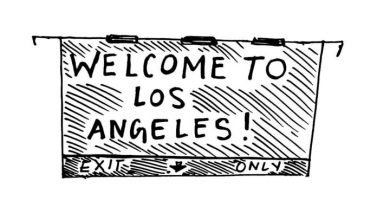“What Now Frau Merkel?” The refugee crisis in Europe might show Angela Merkel the limits of her power

Image: “Angela Merkel, CDU Election Rally in Hamburg” by www.GlynLowe.com via Flickr/CC BY 2.0.
Article written by Claudia Oberst.
At 61 years old, Angela Merkel is the most politically powerful woman in the world, and were it not for Vladimir Putin, she would also be number 1 on Forbes’ list of “The world’s most powerful people.”
Merkel worked hard to get to the top; for the longest time, she was perceived as an accessory to former chancellor Helmut Kohl and was called “Kohl’s girl.”
Now, times have changed and so has the perception of Merkel in Germany and around the world. In October, “Economist” magazine put her on its cover, naming her “The indispensable European.”
Merkel has indeed become the leading political figure on a continent that is struggling with economic crisis, a civil war in Ukraine, and an ever-growing number of asylum-seekers from Africa and the Middle East.
However, while she might be perceived as the backbone of the European Union, the chancellor is not without flaws and the refugee crisis will show how indispensable she really is.
Understated but ambitious
Merkel is a quantum chemist with a Ph.D. in physics, and has been in power since 2005. Her nickname is “Mutti,” “mommy,” as she is some kind of a mother figure for many Germans. They trust her to find the best solutions for the country.
So far, the numbers have been in her favor: Unemployment is down to 6% in the country. Germany is geographically smaller than California but has the fourth biggest economy in the world.
Unlike her male counterparts (think of all the “cool dude” photos of Barack Obama or Vladimir Putin sitting bare chested on a horse), Merkel is a very private person who doesn’t like being in the spotlight. She spends her vacations hiking with her husband Joachim Sauer who teaches chemistry at Humboldt University in Berlin.
Always dressed in flat shoes and a blazer (they come in all colors but only one style), the opera-lover makes up in ambition what she might lack in style. She fought her way to the top in a male-dominated, conservative party (CDU, Christian Democratic Union), taking down rivals if necessary and even forcing her former mentor, Helmut Kohl, to step down amid a political scandal involving illegal forms of party financing.
Her political style has its own name: Merkiavellism, referring to the ruthless Italian politician Niccolo Machiavelli. While she is quick to eliminate political rivals, she likes to wait out problems or adapt to the general public opinion in order to keep her voters happy.
The face of Europe in the world
For the last couple of years, Merkel’s focus has been on international politics. She has safely navigated Germany through the financial crisis that first shook up the world in 2007 and she is working on keeping Greece in the European Union, despite the country’s disastrous financial situation that is threatening the whole continent.
Fluent in Russian, Merkel, as the “The Telegraph” has pointed out, “is the only major Western leader to have a working relationship with Mr Putin.” Apparently, she knows how to deal with blown-up male egos on a diplomatic level, keeping Putin in (some kind of) check regarding the situation in Ukraine.
Merkel does not consider herself a feminist. In a 2013 interview, she described herself as “perhaps an interesting case of a woman in power, but no feminist. Real feminists would be offended if I described myself as one.” This might be because it was not until the G7 summit in Germany this summer that Merkel put women’s rights on the agenda, vowing to improve gender inequality in the workplace.
The always very reserved chancellor had an unusually empathetic moment during a press conference this summer when she talked about the refugee situation: “We can do it,” she said, referring to taking in the tens of thousands of asylum-seekers that have been making their way towards Europe lately.
Germany seemed to be saying “Yes, we can!” in response and pictures of German volunteers welcoming refugees at the train station in Munich went around the world.
Hitting the wall?
The mood has changed, however. In a recent poll, 69% of the population said that they felt that Merkel was losing control over the refugee situation. German cities and states are struggling to find proper accommodation and occupation for the refugees, many of whom are sleeping in school gymnasiums. Especially elderly Germans feel overwhelmed by the sheer mass of people – up to one million refugees are expected to arrive this year.
Merkel reacted sharply to criticism of Germany’s refugee politics: “If we now have to start apologizing for showing a friendly face in response to emergency situations, then that’s not my country.”
The question is how much longer she will be able to be this compassionate. Some of her secretaries and fellow party officials are pushing to stop immigration and deny refugees the right to reunite with their families. The German weekly journal “Die Zeit” already speculates about “the beginning of the end.”
Only time will tell how Merkel responds to her biggest challenge yet. Giving up seems an unlikely option for this power player.
This article was written by a contributing author, Claudia Oberst. Oberst is currently taking the journalism certificate at UCLA Extension. She is both an ardent reader and subscriber of Fem.




